Top: The Superintendent of Lofa County William Tamba Kamba unlawfully imposed fees on planks produced in the county. Graphic by Rebazar Forte
By James Harding Giahyue and Mason Kollie
- The Superintendent of Lofa William Tamba Kamba illegally collects money from plank producers and dealers in the county
- Forestry laws and regulations do not give a superintendent any power to impose fees on wood
- Vahun District fought against the Kamba toll system and halted all payments to him
- Kamba has failed to account for the funds he has collected in three years and counting
VOINJAMA – The Superintendent of Lofa William Tamba Kamba collects fees from plank producers and dealers in the northwestern county, breaking the law and regulation governing a lucrative but secretive subsector of forestry.
Under the National Forestry Reform Law and the Chainsaw Milling Regulation, superintendents have no such power. Practically, only the Forestry Development Authority (FDA), the plank workers union, communities or individuals who own forestlands have.
But since 2020, producers and dealers have had to pay Kamba up to L$1,500 to make or transport planks, according to documents and interviews.
Kamba, who recently constituted a committee on illegal logging and mining, organized a toll taskforce at major FDA checkpoints to collect the so-called “superintendent toll” or “county toll.”
Dealers who transport the woods outside Lofa pay L$1,000 or L$1,500 per truck, depending on the size of the vehicle. Dealers within Lofa pay L$1,500, receipts obtained by The DayLight show. In fact, truck drivers transporting planks must present their toll receipts to pass an FDA checkpoint. Our reporter witnessed some of the payments and checks in Voinjama and Zorzor.
“Now as we are talking, I get two trucks on their way coming I know they took the county fees and the town toll as well,” David Kesselly, a wood dealer in Paynesville, said earlier this month.
Even people who fell trees to make planks, known in the forestry industry as chainsaw millers, pay L$15 per plank and sometimes more.
Kamba introduced the fees in Vahun in 2020 before replicating it across Lofa, plank dealers in the district said.
By then, Vahun’s plank producers and dealers were smuggling planks across the border to Sierra Leone with the help of district officials. Kamba may have taken advantage of a leadership crisis in the district following the suspension of its commissioner in January 2020.
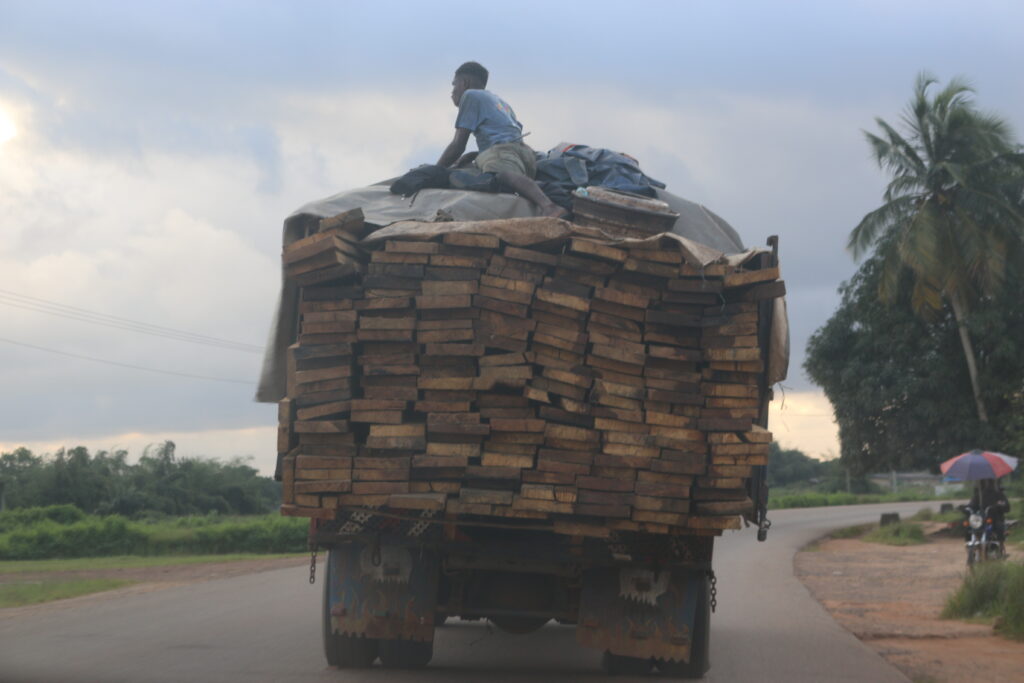
Initially, local officials supported the scheme, according to Duana Momo Kamara, a resident who collected the fees for Kamba at the time. “Many planks were piled in the area as the result of that conflict,” Kamara recalled.
Despite a partial ban on the exportation of planks, those who paid were permitted to export their planks to Sierra Leone, Kamara added. The ban is meant to stabilize the supply of planks on the domestic market, which largely depends on the chainsaw milling subindustry for everything from furniture to construction. Under the regulation, planks can only be exported when barcoded and registered into Liberia’s timber-tracing system, something forestry authorities are yet to put in place.

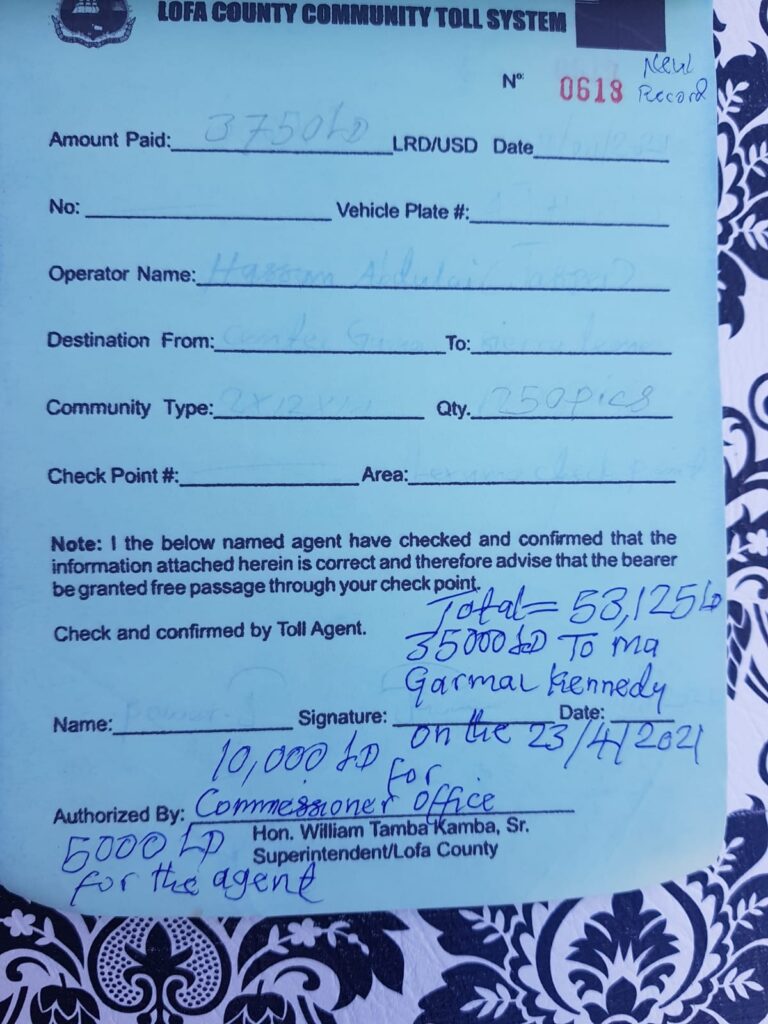
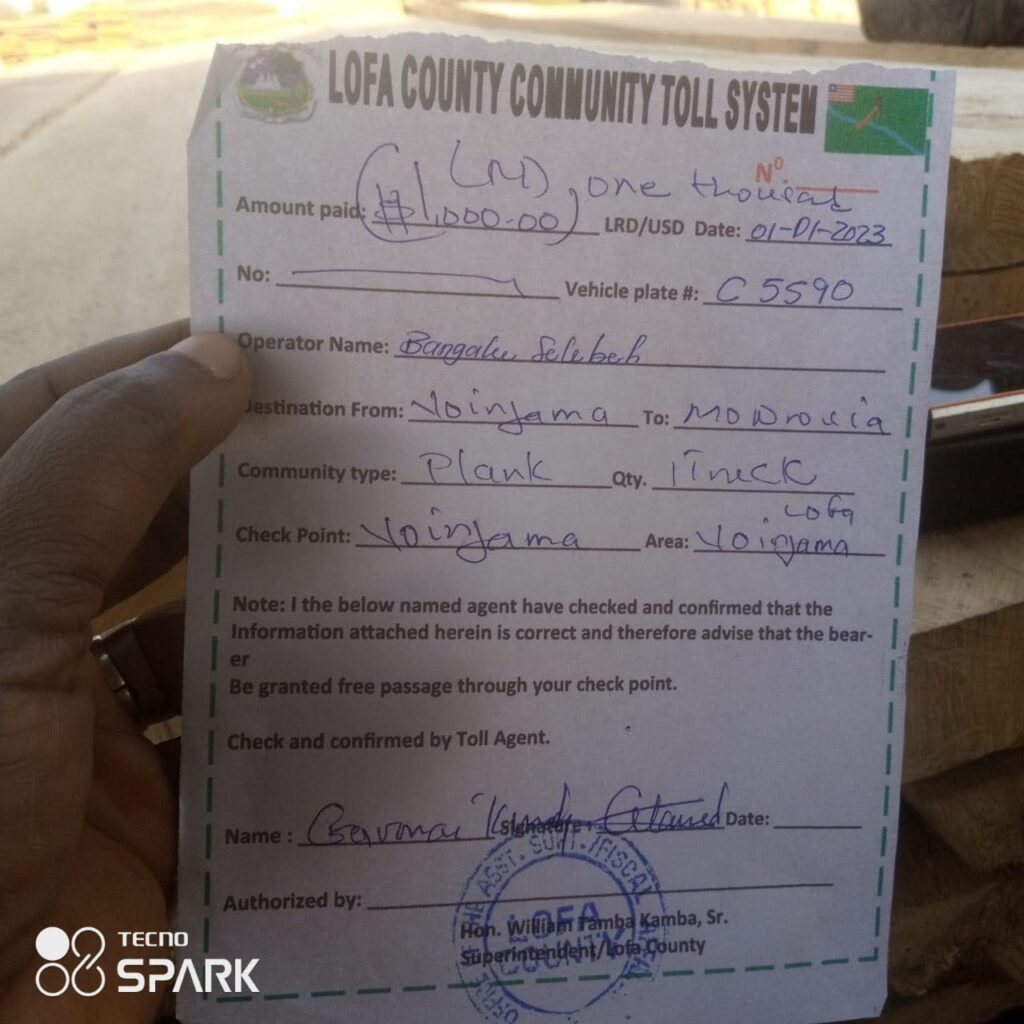
One receipt from Kamara’s records shows he collected L$53,125 at one point in 2021. Out of the amount, L$5,000 was for Kamara, L$10,000 for the Office of the Commissioner of Vahun and L$3,500 for Garmai Kennedy, Lofa’s chief accountant. Kennedy signed several other receipts seen by The DayLight. She declined an interview, referring our reporter to her bosses instead.
Kamba’s Vahun collection continued until last year when Julie Fatorma Wiah, the Representative of Lofa County District #3 halted it. Local officials began to oppose it, over allocation issues and control.
“I told them to stop giving [the] Superintendent money because he is receiving funding for operations from the government,” Wiah told The DayLight. “If the situation continues and we cannot find a common ground, we will have to inform the central government.”
Kamba eventually discontinued the toll system in Vahun sometime last year, with local officials now presiding over the illegal collection.
“I was not happy about the money that goes to the Superintendent because we’re supposed to use the money in the district,” said Christopher Brima, Vahun’s youth president. “We’re not supposed to give it to the Superintendent.”
There is no public record of the money Kamba has received in the three years of his toll system neither is there any account for its expenditure. Kamara claimed that some of the funds were used to transport players of Lofa in the 2022 County Meet but provided no evidence.
“Please help us as a journalist to find out from the FDA and the Superintendent where they are using the money they collect from us,” Armah Ansu, a wood dealer in Voinjama, told our reporter.
Kollie Zumah, a dealer at Liberia’s oldest wood dealership in Sinkor, expressed the same concern. “I cannot tell who the superintendent toll goes to,” he said.
The Office of the Superintendent evaded every effort by The DayLight to access the information. In November last year, Kamba referred our reporter to Kennedy, who said she needed permission from Flomo Jomah, the Assistant Superintendent for Fiscal Affairs.
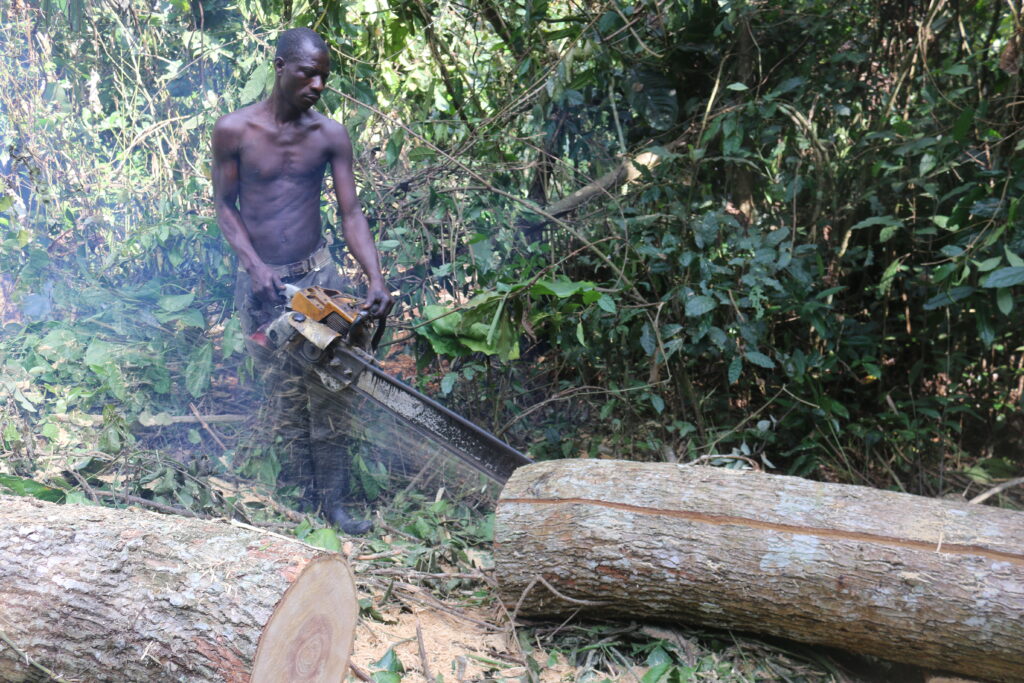
When contacted, Jomah said he was in Monrovia, promising that he would give The DayLight a copy of the toll record upon his return to Voinjama. He has since been out of the county and other efforts to obtain the document up to writing time were unsuccessful.
Plank dealers, who pay a variety of other fees, said Kamba’s toll hurt them. They said the toll—and a high gasoline cost—made them increase prices, with customers paying more for the same or lesser planks.
“As a business person, you will not like to lose. Therefore, for every expense made on the planks, I have to include it during the sale of the planks,” said Kesselly, the wood dealer in Paynesville. He said he pushed the price of his smallest plank from L$1,200 to L$1,350.
“So, obviously, the toll payment makes me increase the prices of the planks,” Kesselly added. The Liberian Chainsaw Miller and Timber Dealers Union (LICSATDUN) confirmed some of its members have complained about the toll.
‘Under our own creation’
Normally, plank dealers pay US$0.60 to the FDA and L$5 to the Liberian Chainsaw Miller and Timber Dealers Union (LICSATDUN) per plank. They also pay unspecified fees to the towns or villages where they fell trees, in some cases, farmers who claim forestlands or “bush owners.”
These fees might be normal but they are not entirely legal. The FDA has failed to regulate the plank sector over the past one-and-a-half decades since it emerged. It has not been transparent about the funds it collects from hundreds of chainsaw millers across the country. The agency did not respond to questions for comments on the matter.
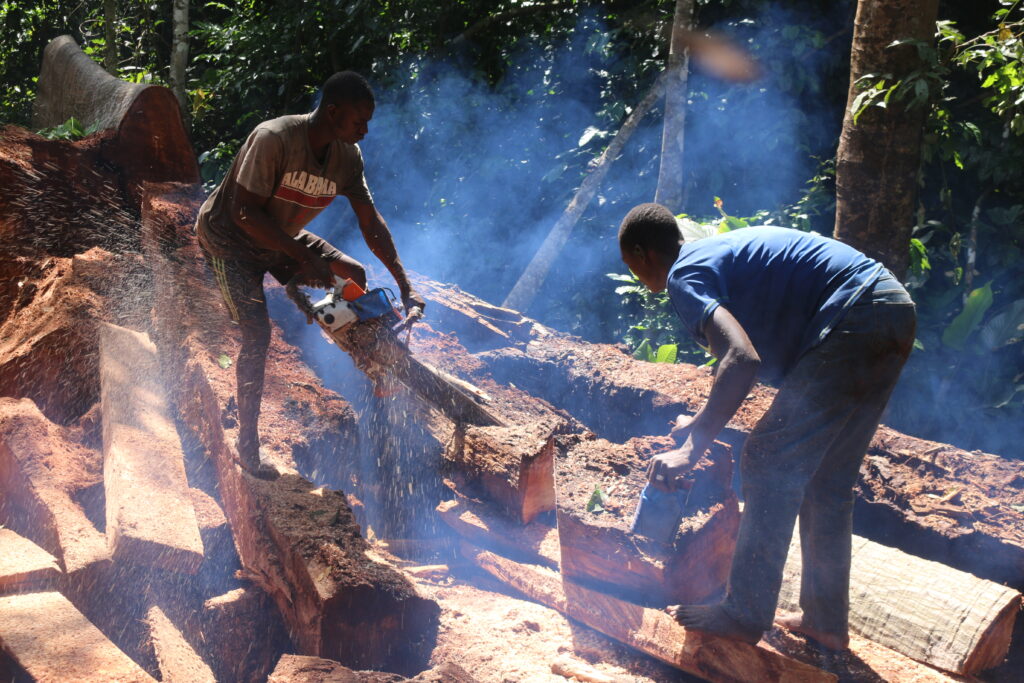
In that November interview, Kamba wrongly claimed that the Local Government Act gave him the right to impose the toll, which he said affected other goods.
“We organized the toll system that is intended to really aid the county to be able to address the number of administrative and some issues that affect the county,” Kamba told our reporter. He claimed to use the fund to maintain the county’s roads and buy stationery “under our own creation.”
But the Local Governance Act, one of the first two legal instruments President Weah signed into law back in 2018, does not give superintendents the power to levy fees on any good. It only gives local governments the authority to raise revenues, done by increasing prices and supplies of goods, etc.
The law gives the power to levy fees or taxes to county councils, governance bodies that comprise chiefs, the youth, the disabled communities and pressure groups. Moreover, the Lofa County Council has not been formed yet, only neighboring Bong County has so far. And Superintendents are not even members of county councils, according to the law.
During our interview, Kamba claimed that the toll system was “[un]functional in most parts of the county,” except in Voinjama, Zorzor and Foya. However, chainsaw millers in Kolahun, Berkeza, Kpasagizia and Salayea told The DayLight they were still paying superintendent toll and some provided receipts.
Kamba’s claim that he uses fees he collected from businesspeople for road repairs appears not to fit the reality. The main route to Lofa is generally currently impassable by vehicles, except for motorcycles and certain cars. It has been that way for decades.
[Emmanuel Sherman, Prince Mulbah and Tenneh Keita contributed to this story.]
This story was a production of the Community of Forest and Environmental Journalists of Liberia (CoFEJ).

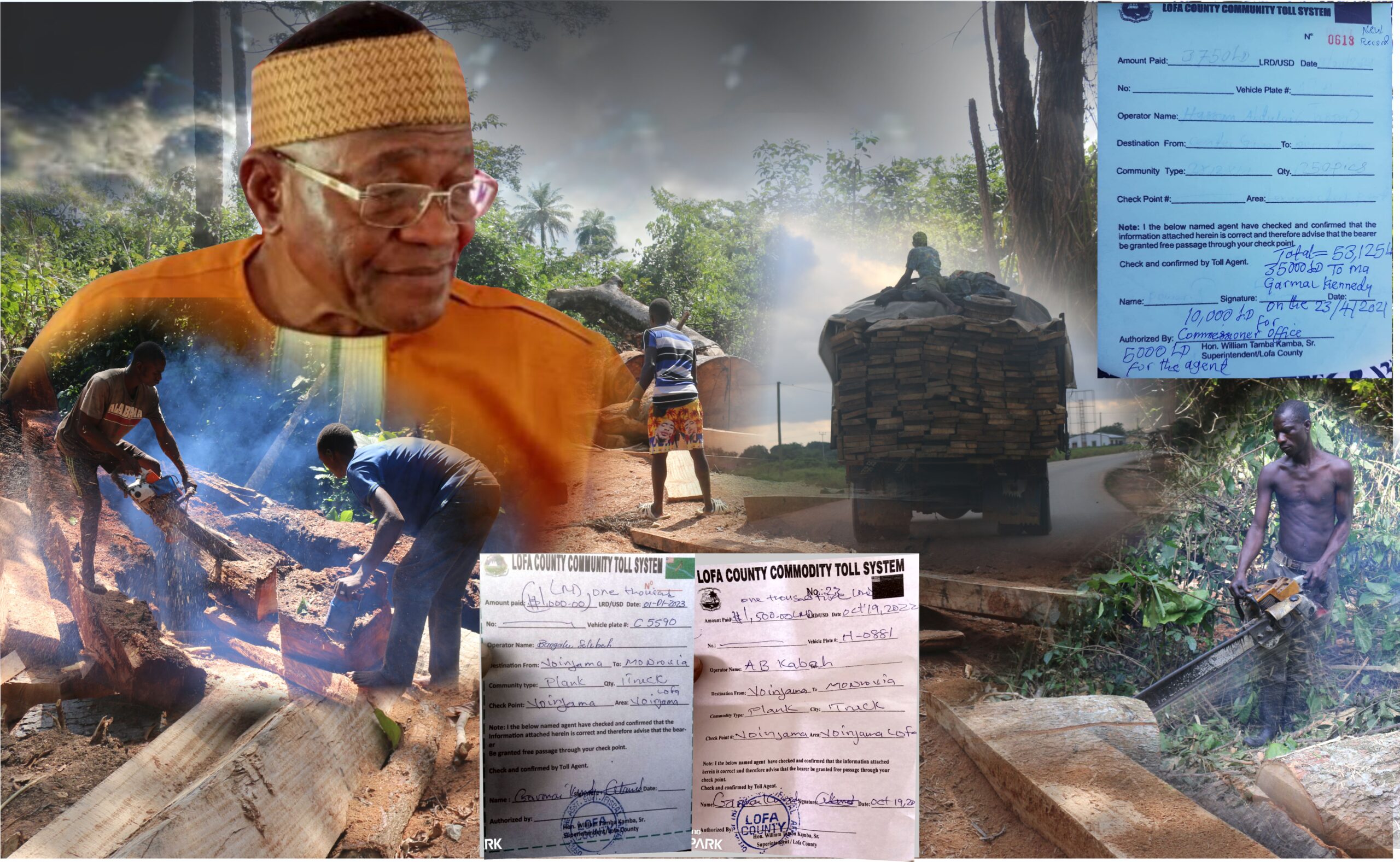


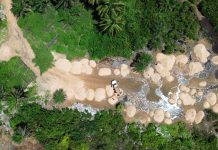
Facebook Comments